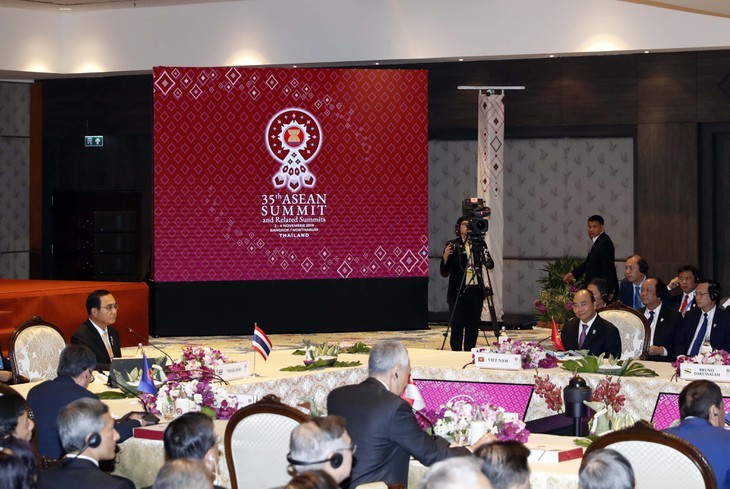(VOVWORLD) - The 35th ASEAN Summit has concluded after a 3-day meeting in Bangkok. Discussions on the East Sea and progress toward the Code of Conduct of Parties in the East Sea drew lots of public attention. The Summit reconfirmed ASEAN’s stance of unity and self-reliance which has underpinned its success over the past 5 decades.
 Photo: VGP/Quang Hieu Photo: VGP/Quang Hieu |
The 35th ASEAN Summit conveyed a message of strengthening ASEAN unity, promoting its central role, broadening and deepening its relations with partners, and generating favorable conditions for the sustainable development of each nation and the region. It identified East Sea stability as the ultimate condition for ASEAN’s development.
Peace, stability in the East Sea are shared interests
The East Sea has always been high on the agenda of ASEAN’s annual summit. An important maritime passage, the East Sea has seen growing tensions and repeated violations of countries’ Exclusive Economic Zones. China has been regularly violating Vietnam’s sovereignty as recognized by international law, particularly the 1982 UN Convention of the Law of the Sea. The Chinese survey vessel Haiyang Dizhi 8 encroached on Vietnam’s EEZ and continental shelf, the Tu Chinh reef (Vanguard Bank) south of the east Sea from July to October. China’s activities have provoked tensions and threatened freedom of navigation and aviation in the East Sea, as well as regional and global peace, security, stability, and development.
At the ASEAN Summit and related meetings, ASEAN leaders and delegates repeatedly mentioned the East Sea issue. Chinese Prime Minister Li Keqiang told the Summit that China stands ready to work with ASEAN countries, build on the existing foundation, and move toward the signing of the COC in 2021.
Shared awareness leads to shared effort
ASEAN countries and partners support a statement on the East Sea that says peace, security, and safety in the East Sea are tied to regional peace and development, and that East Sea issues should be resolved according to international law, the UNCLOS, and ASEAN principles. It’s a shared issue, awareness, and responsibility of ASEAN, although member countries have differing views on certain issues.
In 52 years ASEAN has become an important partner of world powers. ASEAN has bridged regional and global forums, and is conscious of its role in maintaining regional peace, security, and order.